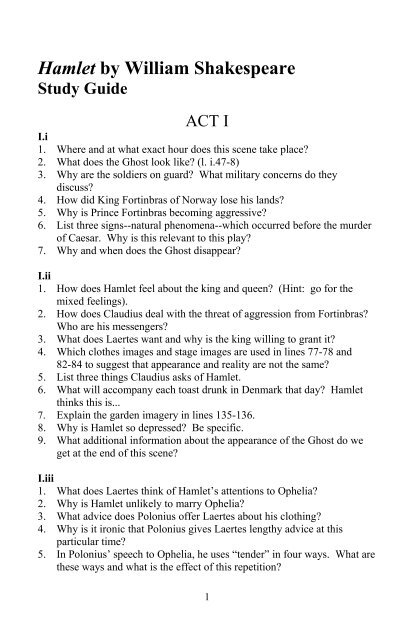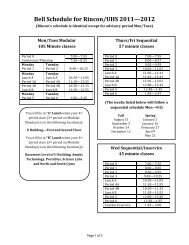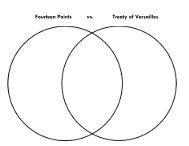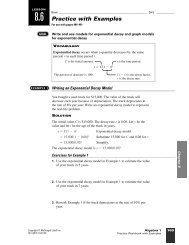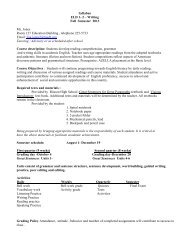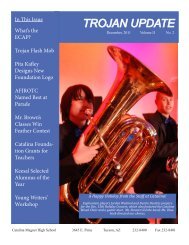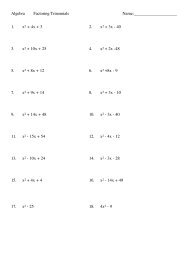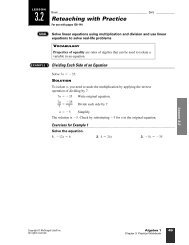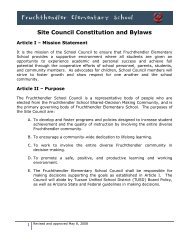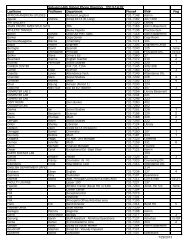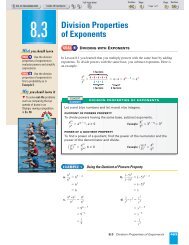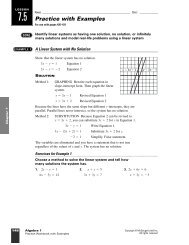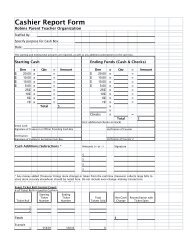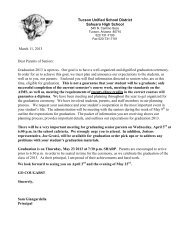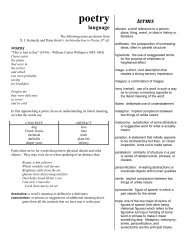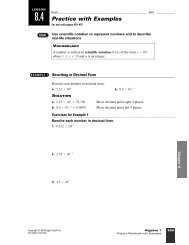Hamlet Study Guide, Act I
Hamlet Study Guide, Act I
Hamlet Study Guide, Act I
Create successful ePaper yourself
Turn your PDF publications into a flip-book with our unique Google optimized e-Paper software.
<strong>Hamlet</strong> by William Shakespeare<br />
<strong>Study</strong> <strong>Guide</strong><br />
ACT I<br />
I.i<br />
1. Where and at what exact hour does this scene take place?<br />
2. What does the Ghost look like? (l. i.47-8)<br />
3. Why are the soldiers on guard? What military concerns do they<br />
discuss?<br />
4. How did King Fortinbras of Norway lose his lands?<br />
5. Why is Prince Fortinbras becoming aggressive?<br />
6. List three signs--natural phenomena--which occurred before the murder<br />
of Caesar. Why is this relevant to this play?<br />
7. Why and when does the Ghost disappear?<br />
I.ii<br />
1. How does <strong>Hamlet</strong> feel about the king and queen? (Hint: go for the<br />
mixed feelings).<br />
2. How does Claudius deal with the threat of aggression from Fortinbras?<br />
Who are his messengers?<br />
3. What does Laertes want and why is the king willing to grant it?<br />
4. Which clothes images and stage images are used in lines 77-78 and<br />
82-84 to suggest that appearance and reality are not the same?<br />
5. List three things Claudius asks of <strong>Hamlet</strong>.<br />
6. What will accompany each toast drunk in Denmark that day? <strong>Hamlet</strong><br />
thinks this is...<br />
7. Explain the garden imagery in lines 135-136.<br />
8. Why is <strong>Hamlet</strong> so depressed? Be specific.<br />
9. What additional information about the appearance of the Ghost do we<br />
get at the end of this scene?<br />
I.iii<br />
1. What does Laertes think of <strong>Hamlet</strong>’s attentions to Ophelia?<br />
2. Why is <strong>Hamlet</strong> unlikely to marry Ophelia?<br />
3. What advice does Polonius offer Laertes about his clothing?<br />
4. Why is it ironic that Polonius gives Laertes lengthy advice at this<br />
particular time?<br />
5. In Polonius’ speech to Ophelia, he uses “tender” in four ways. What are<br />
these ways and what is the effect of this repetition?<br />
1
6. How does Polonius instruct Ophelia to act toward <strong>Hamlet</strong>?<br />
7. Will Ophelia obey her father?<br />
I.iv<br />
1. What is the season of the year and the time of night?<br />
2. What is <strong>Hamlet</strong>’s explanation of and opinion about the sound they hear<br />
while waiting for the Ghost?<br />
3. Lines 40-41 suggest two divergent explanations of Ghosts; explain the<br />
two.<br />
4. What does Horatio fear that the Ghost will do?<br />
5. What provokes Marcellus to say “Something is rotten in the state of<br />
Denmark”?<br />
I.v<br />
1. Where is the Ghost confined when he is not wandering? Why?<br />
2. What does the Ghost want <strong>Hamlet</strong> to do?<br />
3. What account of King <strong>Hamlet</strong>’s death had been given at the time of his<br />
death?<br />
4. How did King <strong>Hamlet</strong> really die?<br />
5. Did Claudius seduce Gertrude before King <strong>Hamlet</strong> died?<br />
6. What is meant by “cut off even in the blossom of my sin”?<br />
7. What warning does the Ghost give <strong>Hamlet</strong> about his mother?<br />
8. What does “Leave her to heaven...” mean?<br />
9. Why do Horatio, <strong>Hamlet</strong>, and Marcellus keep moving around the state<br />
to swear on <strong>Hamlet</strong>’s sword?<br />
10. What does <strong>Hamlet</strong> mean by “antic disposition”?<br />
11. Why does <strong>Hamlet</strong> say “O cursed spite/ That ever I was born to set it<br />
right”?<br />
ACT II<br />
II.i<br />
1. Why does Polonius send Reynaldo to Paris?<br />
2. Briefly describe the how Polonius suggests that “by indirection”<br />
Reynaldo might seek “directions out.” That is, how does Polonius<br />
suggest that Reynaldo gather information?<br />
3. What has frightened Ophelia?<br />
4. How was <strong>Hamlet</strong> dressed?<br />
5. What did Ophelia think was wrong with <strong>Hamlet</strong>?<br />
6. How does Polonius explain this incident?<br />
7. Why does Polonius set off to see the King?<br />
2
II.ii<br />
1. Why has the King sent for Rosencrantz and Guildenstern?<br />
2. Compare the beginning of the scene with the beginning of the previous<br />
scene. How are they alike?<br />
3. What reward does the Queen suggest that Rosencrantz and Guildenstern<br />
may receive? (lines 25-6)<br />
4. From line 43, does Claudius seem to value Polonius or to disregard him?<br />
5. To what causes does Gertrude attribute <strong>Hamlet</strong>’s “distemper” or<br />
“lunacy”?<br />
6. Old Norway thought young Fortinbras was preparing to fight the<br />
____________.<br />
7. Fortinbras, however, was actually preparing to fight____________.<br />
8. What is old Norway’s state of age, health and power?<br />
9. What request does Norway make of Denmark?<br />
10. What is Polonius’ definition of madness.<br />
11. What does Gertrude mean when she says “more matter with less art”?<br />
12. To what does Polonius attribute <strong>Hamlet</strong>’s madness?<br />
13. Compare <strong>Hamlet</strong>’s conversation with Rosencrantz and Guildenstern<br />
with his preceding conversation with Polonius. What do you conclude<br />
about <strong>Hamlet</strong>’s madness?<br />
14. Why does <strong>Hamlet</strong> suspect that Rosencrantz and Guildenstern were sent<br />
for?<br />
15. What is <strong>Hamlet</strong>’s mood as he describes it in lines 283-298?<br />
16. <strong>Hamlet</strong> is familiar with the players Rosencrantz mentions in line 301+.<br />
Why are these players traveling?<br />
17. According to <strong>Hamlet</strong>, what do those who used to make faces at Claudius<br />
do now?<br />
18. Why does Polonius consider it significant that <strong>Hamlet</strong> brings of<br />
Jephthah and his daughter? Is he correct?<br />
19. What concerns does <strong>Hamlet</strong> have about the boy-actress’ voice and<br />
height?<br />
20. <strong>Hamlet</strong> asks the player to speak a speech from a play . What is the<br />
subject of that speech, which <strong>Hamlet</strong> begins and the Player King<br />
completes, and why is it significant? What does it indicate about<br />
<strong>Hamlet</strong>’s values and state of mind?<br />
21. What play does <strong>Hamlet</strong> ask the players to perform on the following<br />
night? What does he want added?<br />
22. What contrast does <strong>Hamlet</strong> make between himself and the Player King?<br />
23. What is <strong>Hamlet</strong>’s plan “to catch the conscience of the king.”?<br />
24. Why does he need proof that the ghost is honest?<br />
3
25. With what famous words does <strong>Act</strong> II end? Why is this couplet<br />
important?<br />
ACT III<br />
III.i<br />
1. What do Rosencrantz and Guildenstern report to the king and queen<br />
about their success with <strong>Hamlet</strong>?<br />
2. What plan do the king and Polonius devise to test whether or not the<br />
cause of <strong>Hamlet</strong>’s conduct is love for Ophelia?<br />
3. Explain the contents of Polonius’ lines “We are oft to blame in this – Tis<br />
too much proved, --that with devotion’s visage / and pious action we do<br />
sugar o’er / The devil himself.”<br />
4. What effect does this comment have on the king?<br />
5. In the famous “To be or not to be…” soliloquy what is it that <strong>Hamlet</strong><br />
concludes?<br />
6. Why does <strong>Hamlet</strong> assume madness in his interview with Ophelia and<br />
speak so harshly to her?<br />
7. What advice does <strong>Hamlet</strong> give Ophelia?<br />
8. Explain lines beginning “I say, we will have no more marriages…”<br />
9. What is the tone of Ophelia’s soliloquy?<br />
10. What does the king infer from <strong>Hamlet</strong>’s soliloquy and his words to<br />
Ophelia?<br />
11. Why does the king fear <strong>Hamlet</strong>?<br />
12. What suggestion does Polonius make?<br />
III.ii<br />
1. What does <strong>Hamlet</strong> say the mission of the drama is?<br />
2. Why does <strong>Hamlet</strong> speak to Horatio in the manner in which he does?<br />
3. What is the dramatic purpose of his speech?<br />
4. What does <strong>Hamlet</strong> say to Horatio about the play and his purpose in<br />
presenting it?<br />
5. What change is there in <strong>Hamlet</strong> after the king, queen, Polonius and<br />
Ophelia have entered?<br />
6. What puns does <strong>Hamlet</strong> make in speaking to Polonius?<br />
7. What is the plot of the play which is presented before the king and<br />
queen?<br />
8. What is meant by “dumb-show”?<br />
9. What effect does the play have upon the king?<br />
10. What point in the ‘play within a play’ has been reached when Claudius<br />
reacts?<br />
11. When all have left except <strong>Hamlet</strong> and Horatio, how does the former act?<br />
4
12. Do <strong>Hamlet</strong> and Horatio now accept entirely without any reservations the<br />
message of the ghost?<br />
13. What request from the queen does Rosencrantz bring?<br />
14. What metaphorical comparison does <strong>Hamlet</strong> make between<br />
Guildenstern and a player’s pipe?<br />
15. Of what does <strong>Hamlet</strong> charge Guildenstern?<br />
16. What is the emphasis of <strong>Hamlet</strong>’s soliloquy at the close of this scene?<br />
17. What has been accomplished dramatically in this scene?<br />
III.iii<br />
1. In his soliloquy, what does the king reveal of the murder; what of his<br />
mental, moral condition?<br />
2. What are <strong>Hamlet</strong>’s reasons for not killing the king when he finds him<br />
alone, praying? Why is this terribly ironic?<br />
III.iv<br />
1. Whom does <strong>Hamlet</strong> kill? Who did he think it was at first?<br />
2. Why does Shakespeare cause <strong>Hamlet</strong> to kill at this time?<br />
3. How does <strong>Hamlet</strong> chide his mother?<br />
4. What description does he give her of her first husband?<br />
5. Why does the ghost come?<br />
6. Why does Gertrude think <strong>Hamlet</strong>’s words and conduct indicate insanity?<br />
7. What appeal does <strong>Hamlet</strong> make to his mother to reform?<br />
8. What does <strong>Hamlet</strong> say to his mother concerning himself and his words<br />
to her?<br />
9. What does <strong>Hamlet</strong> say about his journey to England?<br />
10. What does he say about his purpose to circumvent the plot of the king?<br />
ACT IV<br />
IV.i<br />
1. Who tells the King about Polonius?<br />
2. What promise to <strong>Hamlet</strong> does Gertrude keep in her second statement?<br />
3. What is Claudius’s first reaction to the news of Polonius’s death?<br />
4. What excuse does Claudius offer for not controlling <strong>Hamlet</strong> with a<br />
stronger hand?<br />
5. Explain Claudius’s comparison of this laxity and disease.<br />
6. What does the Queen say <strong>Hamlet</strong> is doing while she and the King are<br />
talking?<br />
7. On what errand does the King send Rosencrantz and Guildenstern?<br />
IV.ii<br />
5
1. In the first line what is “Safely stow’d”?<br />
2. Why does <strong>Hamlet</strong> call Rosencrantz a sponge?<br />
3. To what else besides a sponge does <strong>Hamlet</strong> compare Rosencrantz and<br />
Guildenstern?<br />
IV.iii<br />
1. Why must the King be careful in his treatment of <strong>Hamlet</strong>?<br />
2. “Diseases desperate grown/ by desperate appliance are relieved/ Or not<br />
at all.” Explain the analogy.<br />
3. When Claudius asks <strong>Hamlet</strong> where Polonius is, what is <strong>Hamlet</strong>’s<br />
answer?<br />
4. Define “progress” in line 31 and explain the progress that <strong>Hamlet</strong><br />
describes.<br />
5. Where has <strong>Hamlet</strong> “stow’d” the body? How might it eventually be<br />
found?<br />
6. When <strong>Hamlet</strong> says good-bye to Claudius, line 49, what does he call him<br />
and why?<br />
7. For what reason is Claudius certain England will instantly obey his<br />
command?<br />
8. What command does Claudius send to England?<br />
9. Define “hectic” and explain the comparison in lines 66-67.<br />
IV.iv<br />
1. For what purpose is Fortinbras in Denmark?<br />
2. Where are Fortinbras and his army going?<br />
3. What will they fight for in Poland?<br />
4. What is the object of their fight worth?<br />
5. “Sure He that made us with such large discourse, / Looking before and<br />
after, gave us not / That capability and godlike reason / To fust in us<br />
unused.” Define “discourse” and “fust.”<br />
6. <strong>Hamlet</strong> says Fortinbras is risking his men and his own life “even for an<br />
_________. Why does he say this?<br />
7. How does Fortinbras serve as a spur to <strong>Hamlet</strong>’s revenge?<br />
IV.v<br />
1. Who is with Gertrude when Ophelia arrives?<br />
2. Why does Horatio urge Gertrude to see Ophelia?<br />
3. Explain lines 15-20; what is Gertrude afraid of?<br />
4. What is the subject matter of Ophelia’s first song?<br />
5. From line 44, what does Claudius assume caused Ophelia’s madness?<br />
6. What is the subject of Ophelia’s second song?<br />
6
7. Who is sent to follow Ophelia?<br />
8. Why are the people of Denmark upset?<br />
9. What is “hugger-mugger”?<br />
10. What new information does Claudius reveal?<br />
11. What are “Swissers”?<br />
12. The mob that is supporting Laertes are crying for him to become<br />
___________.<br />
13. Gertrude calls his followers _________________________.<br />
14. According to Laertes, if he were calm, it would mean that he was a<br />
___________, his father a ________________, and his mother a<br />
_________________.<br />
15. What will Laertes risk for revenge?<br />
16. Who enters and interrupts the encounter between Laertes and the King?<br />
17. To whom does Ophelia give flowers in lines 173-178?<br />
18. What do the flowers, or herbs, given to Claudius and Gertrude signify?<br />
19. Why is Laertes disturbed about Polonius’s burial?<br />
IV.vi<br />
1. Why does Horatio suspect that the sailors come from <strong>Hamlet</strong>?<br />
2. We learn from <strong>Hamlet</strong>’s letter that the pirates took how many prisoners?<br />
3. Why do the sailors need to see the King?<br />
4. Why were the pirates good to <strong>Hamlet</strong>?<br />
5. Where are Rosencrantz and Guildenstern?<br />
IV.vii<br />
1. In Claudius’s first speech he tell Laertes that <strong>Hamlet</strong> not only killed<br />
Polonius, but also tried to kill __________________.<br />
2. What reasons does Claudius give for not acting to prevent <strong>Hamlet</strong>’s<br />
violence?<br />
3. How does Claudius feel about Gertrude?<br />
4. What, according to Claudius, would have happened if Claudius had<br />
accused <strong>Hamlet</strong> to the people?<br />
5. In a single sentence, sum up <strong>Hamlet</strong>’s letter to Claudius.<br />
6. In lines 61-68, Claudius tells Laertes that <strong>Hamlet</strong>’s death will be<br />
arranged to look like an _____________, so that not even<br />
______________ will suspect.<br />
7. Who brought new of Laertes’s “art in defense”?<br />
8. How is <strong>Hamlet</strong> reported to feel about Laertes’s skill?<br />
9. What is “a sword unbated”?<br />
10. What “added ingredient” does Laertes suggest to make the hit more<br />
deadly?<br />
7
11. How powerful is this “added ingredient”?<br />
12. What back-up-measure does Claudius suggest?<br />
13. The Queen comes in to announce that<br />
_____________________________.<br />
14. What was Ophelia doing under the willow tree?<br />
15. How did she get into the stream?<br />
16. What first bore her up and then pulled her under?<br />
ACT V<br />
V.i-ii<br />
1. What does <strong>Hamlet</strong> say about Alexander and Caesar?<br />
2. What does the churlislh priest say about the obsequies of Ophelia?<br />
Why?<br />
3. If <strong>Hamlet</strong> was sincere and truthful in saying he loved Ophelia, why did<br />
he treat her as he did?<br />
4. How did <strong>Hamlet</strong> feel toward Laertes?<br />
5. How old is <strong>Hamlet</strong>?<br />
6. In what way is the “image” of <strong>Hamlet</strong>’s cause the “portraiture” of<br />
Laertes’ cause?<br />
7. How and why do <strong>Hamlet</strong> and Horatio make fun of Osric?<br />
8. Despite <strong>Hamlet</strong>’s assurance in his skill, what sort of feeling does he<br />
have about the coming fencing match?<br />
9. What is Horatio’s response and why is this response illogical for a<br />
scholar? What does it indicate about Horatio? (V.ii.192)<br />
10. What attitude do the following lines from V.ii.194-8 suggest: “There is a<br />
special providence in the fall of a sparrow.”; “The readiness is all.”;<br />
“Let be.”?<br />
11. How does Laertes accept <strong>Hamlet</strong>’s apology?<br />
12. What request does Laertes make as he dies?<br />
13. Explain the line, “I am more an antique Roman than a Dane.”<br />
14. To what does Fortinbras compare the sight of the four dead bodies?<br />
8


